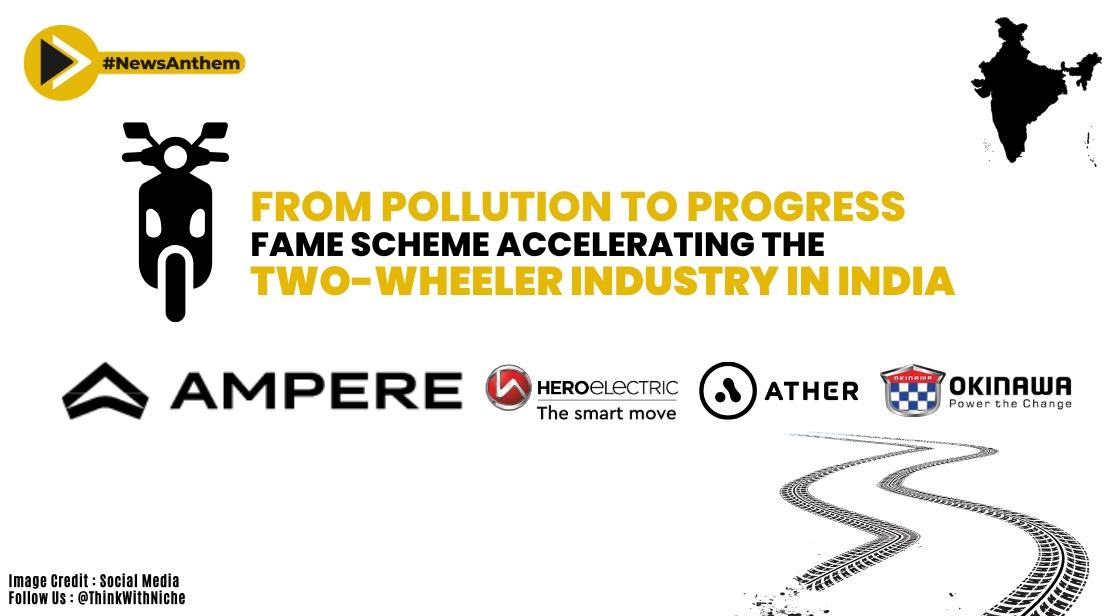From Pollution to Progress-FAME Scheme Accelerating the Two-Wheeler Industry in India

News Synopsis
The electric vehicle (EV) industry in India has been growing rapidly, with a focus on two-wheeler EVs. The Ministry of Heavy Industries and Public Enterprises launched the Faster Adoption and Manufacturing of Hybrid and Electric Vehicles (FAME) scheme in 2015 as part of the National Electric Mobility Mission Plan to increase the penetration of hybrid and electric vehicles in India with the goal of shifting at least 30% of overall transportation to EVs by 2030.
Let's take a closer look at the FAME scheme and its advantages for industry players, FDI, and startups.
The FAME Scheme: From Pollution to Progress: Accelerating the Two-Wheeler Industry in India
The FAME scheme is a government initiative that provides incentives for the adoption and manufacturing of hybrid and electric vehicles in India. It was launched in 2015 with a budget of INR 795 crore ($110 million) for the first two years.
The scheme has since been extended until March 2024, with a total budget of INR 10,000 crore ($1.4 billion).
The scheme offers incentives to manufacturers, consumers, and charging infrastructure providers to accelerate the adoption of EVs.
These incentives include:
Faster Adoption and Manufacturing of Hybrid and Electric Vehicles (FAME) II Scheme: The scheme provides a subsidy of up to INR 15,000 ($208) for two-wheelers and up to INR 2.5 lakh ($3,463) for four-wheelers to buyers.
Production-Linked Incentive (PLI) Scheme: The scheme aims to boost the domestic manufacturing of ACCs and other critical EV components.
GST Reduction: The GST on EVs has been reduced from 12% to 5%, while the GST on chargers/charging stations has been reduced from 18% to 5%.
The FAME scheme is especially beneficial to startups looking to enter the EV industry.
The scheme offers a range of incentives, including tax benefits, subsidies, and support for research and development.
Top 4 EV Two-Wheeler Companies in India for 2023
1. Hero Electric: Hero Electric is one of the leading electric two-wheeler manufacturers in India. The company has a wide range of electric scooters, including the Optima, Flash, Nyx, and Photon. The company has a market capitalization of INR 2,725.99 crore ($377 million) and plans to increase its production capacity to 5 lakh units by 2025.
2. Okinawa Autotech: Okinawa Autotech is a popular EV two-wheeler company in India.
The company's product range includes iPraise+, Praise Pro, Ridge+, and Lite. The company has a market capitalization of INR 1,692.68 crore ($234 million) and aims to expand its production capacity to 1.2 lakh units by 2022.
3. Ather Energy: Ather Energy is a Bangalore-based electric scooter manufacturer that has been gaining popularity in India.
The company's product range includes the Ather 450X and the Ather 450 Plus.
The company has a market capitalization of INR 1,641.59 crore ($227 million) and plans to expand its production capacity to 2 lakh units by 2023.
4. Ampere Electric Vehicles: Ampere Electric Vehicles is another Indian electric two-wheeler company that is making waves in the market.
They have a range of electric scooters and bikes, including the popular Ampere Magnus Pro and Ampere Zeal.
The company has a market capitalization of INR 1,049.12 crore ($145 million) and plans to increase its production capacity to 1 lakh units by 2022.
FAME Scheme: Advantages to Industry Players, FDI, and Startups
The FAME scheme provides a significant advantage to industry players, foreign direct investment (FDI), and startups.
Under this scheme, the Indian government provides subsidies and incentives to companies that manufacture and sell electric and hybrid vehicles.
These incentives include:
1. Financial assistance for research and development (R&D) activities related to electric and hybrid vehicle technology
2. Subsidies for the purchase of electric and hybrid vehicles
3. Assistance for the development of charging infrastructure across the country
4. Tax benefits for companies that invest in the electric vehicle manufacturing industry
5. Reduction in GST on electric vehicles and charging stations
These incentives have encouraged many industry players and startups to invest in the electric vehicle manufacturing industry in India.
The FAME scheme has created a conducive environment for companies to manufacture and sell electric two-wheelers in India, which has led to increased competition and improved quality.
Foreign investors have also shown interest in investing in the Indian electric vehicle market, thanks to the FAME scheme.
The scheme has encouraged the establishment of joint ventures and partnerships between Indian and foreign companies, which has resulted in the transfer of technology and knowledge sharing.
The FAME scheme has been particularly beneficial for startups that are looking to enter the electric vehicle market.
The subsidies and incentives provided by the government have significantly reduced the entry barrier for startups, allowing them to compete with established players in the industry.
From Pollution to Progress: The FAME Scheme and India’s Shift towards Electric Two-Wheelers
ThinkWithNiche Take on the News Post: The FAME scheme has played a significant role in accelerating the adoption of electric and hybrid vehicles in India, particularly in the two-wheeler segment.
The scheme's incentives have encouraged industry players, foreign investors, and startups to invest in the electric vehicle manufacturing industry in India, leading to increased competition, improved quality, and reduced costs.
As a result, India is on track to achieve its goal of shifting at least 30% of overall transportation to EVs by 2030.
India's FAME Scheme Boosts Electric Two-Wheeler Manufacturing with Incentives and Reduced Costs.









